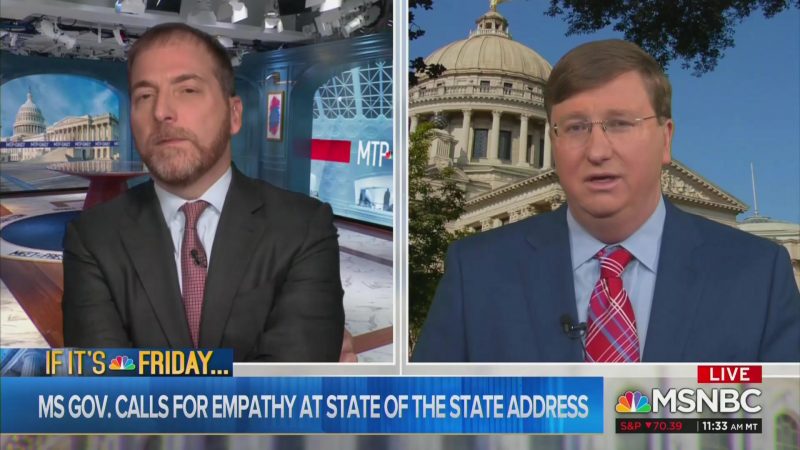Joy Reid’s Cyber-Security Expert: ‘Significant Evidence’ Her Old Blog Was ‘Compromised’

Earlier this week, Mediaite published a bombshell report on the discovery of a large number of homophobic posts that had been discovered on MSNBC host Joy Reid’s now-defunct blog, The Reid Report. The blog posts were different than the ones on former Florida Governor Charlie Crist that surfaced this past December, posts that Reid had already apologized for.
Reid provided a statement to Mediaite in which she said the posts had been “fabricated” and the “manipulated material seems to be part of an effort to taint my character with false information by distorting a blog that ended a decade ago.” She also noted she was working with a cyber-security expert.
On Tuesday, the Internet Archive published a blog post stating that they saw no evidence that supported Reid’s claims that her blog was hacked.
“When we reviewed the archives, we found nothing to indicate tampering or hacking of the Wayback Machine versions,” the post read. “At least some of the examples of allegedly fraudulent posts provided to us had been archived at different dates and by different entities.”
Hours after that post went up, Reid’s cyber-security expert, Jonathan Nichols, released a statement noting that there was “significant evidence” that Reid’s old blog was “compromised.” On top of that, Nichols wrote “some of the recently circulated posts were not even on the site at any time, suggesting that these instances may be the result of screenshot manipulation with the intent to tarnish Ms. Reid’s character.”
Nichols statement can be read in full below:
“Five months ago, we found evidence Joy Reid’s now-defunct blog, The Reid Report, was breached after a review of suspicious activity.
We discovered that login information used to access the blog was available on the Dark Web and that fraudulent entries – featuring offensive statements – were entered with suspicious formatting and time stamps. The posts included hate speech targeting marginalized communities and Ms. Reid has been explicit in condemning them.
Some of the posts in question were made while Ms. Reid was on the radio hosting her show. Text and visual styling was inconsistent with her original entries.
In December, shortly after the review, Ms. Reid’s attorney wrote to archive.org and Blogger.com to advise them that the blog had been compromised, and that the pages appearing in the Wayback Machine archive included fraudulent posts.
The letters detail the evidence that many of the blog posts were made up, including the times posted (times when Ms. Reid hosted her radio show), unusual structure and anomalies within the posts and ghosting around images.
We also asked Blogger.com for forensic data such as time stamps, IP addresses, and User-Agent data which would help us to learn more about the posts and where the fraudulent poster might be located. Blogger.com told us the data was
not available.
At no time has Ms. Reid claimed that the Wayback Machine was hacked, though early in our investigation, we were made aware of a breach at archive.org which may have correlated with the fraudulent blog posts we observed on their website. We simply wanted to ascertain whether that breach was related to the compromising of Ms. Reid’s blog.
Once our team determined that the two intrusions were unrelated, we merely attempted to have the fraudulent posts removed from archive.org. They refused this request.
However, we have significant evidence indicating that not only was Ms. Reid’s old blog compromised, some of the recently circulated posts were not even on the site at any time, suggesting that these instances may be the result of screenshot manipulation with the intent to tarnish Ms. Reid’s character. Oddly, there were no responses in the comments section of the entries, despite the inflammatory nature of the posts. If those posts were real, they would have undoubtedly elicited responses from Ms. Reid’s base. There was also no contemporaneous verification or memory from Ms. Reid’s peers or individuals she regularly debated online.
As a result we are continuing our own investigation and cooperating with federal law enforcement in their attempt to identify the source of this activity.
Respectfully,
Jonathan Nichols
Independent Security Consultant
Jonathan Nichols is an independent security consultant. He has played a role in predicting, detecting, and mitigating some of the largest hacking campaigns in recent years. As part of Operation Iraqi Freedom and Operation Enduring Freedom, Jon spent three years deployed in support of NATO Special Operations. Jon has years of experience in building cyber security teams which focus on the humans behind the keyboards and the underlying influences which
motivate their actions. He can be seen discussing cyber security topics on CNN and Vice documentaries, and regularly contributes to many mainstream media articles on cyber security issues.“






